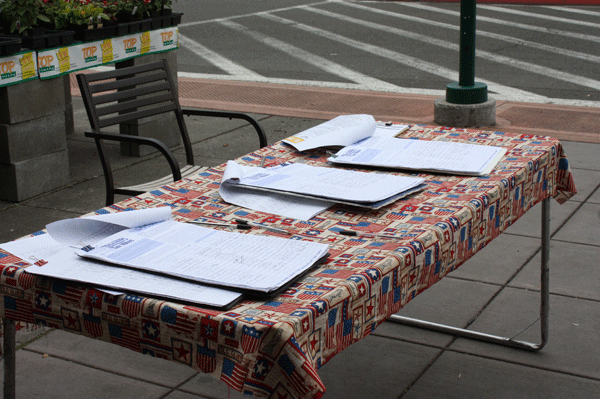Elections Division will seek probe of initiative fraud
The Washington Elections Division probe has confirmed apparent initiative fraud involving three paid signature-gatherers for two Initiatives to the Legislature recently certified for legislative consideration.
The three collected over 8,000 signatures, 3,644 for Tim Eyman’s I-517 dealing with the initiative process, and 4,483 for I-522, dealing with genetically engineered food. Many of the signatures, names and addresses didn’t match those on file.
The information will be turned over to the State Patrol for investigation and possible referral for prosecution. It is a Class C felony to commit petition fraud, punishable by up to five years in prison and a fine of up to $10,000.
Secretary of State Kim Wyman says the cases involve the worst apparent initiative fraud anyone can remember, and pledged that the state’s continuing crackdown will continue, possibly with tougher regulations.
Wyman said:
“This kind of disrespect of the voters and our cherished initiative process cannot be tolerated, and I want these cases fully investigated, and if appropriate, as it certainly appears, I want these people prosecuted,” she said. “I’m sure that sponsors of ballot measures demand that their solicitors be accurate and honest, but we’ve always feared that use of pay-per-signature encourages bad behavior.
“That has been debated in the Legislature for a number of years, most recently in 2006-07, and the courts have said we cannot ban paid signature-gathering, on free-speech grounds. In recent years, we have monitored this closely and have uncovered problems with bogus signatures being turned in – until now, fairly small in number. Now we have cases involving hundreds or thousands of signatures and once they are adjudicated, we will be able to show hard evidence and documentation that we sometimes get fraud and forgery.
“The good news is that we do have rigorous fraud-check procedures and law enforcement that takes this seriously. I am glad that we are reviewing petitions with a very careful eye, setting aside questionable petition sheets for additional signature checks.”
Signature-checkers at the state Elections Division spotted the problem during a review of thousands of petition sheets submitted by sponsors of the two initiatives recently. The problem petitions did not jeopardize the initiatives being certified, since campaigns had submitted far more than the minimum number required, 241,153.
The Elections study showed that one solicitor for I-517 was responsible for sheets bearing 599 signatures, many not valid. A check of each signature showed about 53 percent were valid, but the rest were invalid, many with signatures that didn’t match the one on file for the voter by that name and address. A second I-517 solicitor had an even worse batch. Of over 3,000 signatures, less than 5 percent were valid. The same solicitor also turned in apparently fraudulent signatures for I-522, with only 4 percent of the 2,371 signatures found to be valid. A second I-522 signature-gatherer was even worse than that, with less than 2 percent of the 2,112 signatures accepted as valid.
State Elections Director Lori Augino said her office may be recommending tougher state laws and regulations. Staff will meet with Oregon counterparts to discuss their system and solutions, she said.
